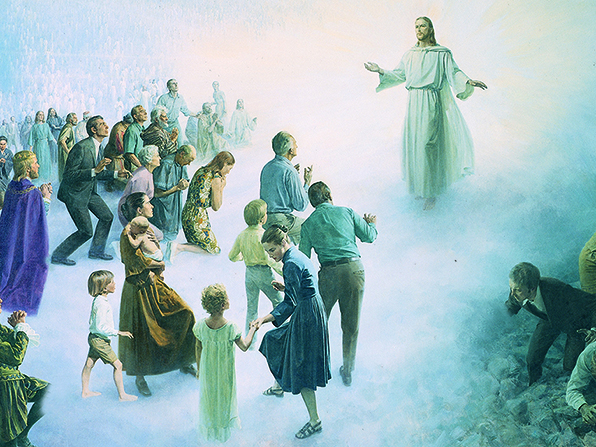This past weekend was one that I was looking forward to for a long time, and it did not disappoint! The reason that I was so excited was General Conference! General Conference is a meeting that is held every six months by the Church of Jesus Christ of Latter-Day Saints in which our leaders give us counsel and advice on how to conduct ourselves and brace for the challenges of the next six months.
The many speakers at General Conference are rarely given a specific topic to discuss, but are instead asked to pray and ponder on what the needs of the church are at that time. Despite the fact that the speakers do not correlate, there are often subtle "themes" for each conference. This conference, one of the biggest themes that I saw was Responding to Opposition. By Responding to Opposition, I mean the idea of "disagreeing without being disagreeable". Responding to Opposition means being both confident and loving when others challenge the things we believe.
Opposition has been a hallmark of Christianity and religion in general for a long time. It is becoming taboo to talk about religion in public and professional settings, and many religious principles are ridiculed in the media and in the intellectual world. This is the kind of opposition that I'm concerned about, and it is going to increase in the coming months and years. It isn't always explicit or hostile, but it is there. Even between religious sects, there are simple misunderstandings that can lead to stigmas and tension.
Now, the natural human response when people criticize our beliefs, whether religious or otherwise, is not productive. Human nature tells us to get defensive or angry, to fight back, or to label groups of people as "us" and "them", or even "friend" and "foe". We are inclined to lose our tempers, to hold ourselves aloof from any actual discussion, and sometimes to hold long and bitter grudges.
But what does that accomplish? What do we gain from that? Well, it is certainly the
easiest path, in that it doesn't require us to make informed decisions about the people around us. But is the
easiest path the
best path?
Short answer: no.
Elder Zwick, one of the speakers at General Conference, gave
an excellent talk entitled "What Are You Thinking?" In it, he gave some advice about reacting in a Christlike manner to people we may not have the kindest feelings towards. He said:
"We have seen unchecked anger erupt in public places. We have experienced it...at sporting events, in the political arena, and even in our own homes.
"All of us... have regretted jumping headlong from the high seat of self-righteous judgment and have spoken with abrasive words before we understood a situation from another’s perspective. We have all had the opportunity to learn how destructive words can take a situation from hazardous to fatal.
"There exists today a great need for men and women to cultivate respect for each other across wide distances of belief and behavior and across deep canyons of conflicting agendas. It is impossible to know all that informs our minds and hearts or even to fully understand the context for the trials and choices we each face."
In essence, Elder Zwick asked each of us, before we say something we regret, to take a moment and consider the other person's perspective. While his words were mostly in regard to our daily interactions with family and friends, they apply perfectly to the way we respond to opposition to the church as well.
So, how should we react when someone challenges the things we believe? Well, first things first, REMEMBER TO BE RESPECTFUL! If you immediately jump to the conclusion that you are under attack and that you need to shout empty rhetoric at the other person until they agree to get baptized into your church, you are taking the wrong approach.
Instead, take a minute to employ Elder Zwick's advice. Consider where the other person is coming from. Maybe they heard an inaccurate description of your views. Maybe they have had a personal experience that makes the topic they've brought up a very touchy one. Maybe they're genuinely curious about what you believe! Next, make sure you understand their concern. We've all experienced that awkward conversation where you ask a simple question and get a long-winded answer...to a different question. Make sure you know what you're saying and what they're saying. Finally, try to respond to their concern in a clear, concise fashion. If they are genuinely interested, you can go into some detail about why you believe the things you do. If you sense that the other person is just trying to pick a fight, you can give a brief statement of what you believe, then drop or change the topic as tactfully as you can. Above all, remain calm and friendly as you talk!
To demonstrate, let's look at the following conversation that I just made up in my head. I'm going to use the name "John" for us, and "McKenna" for the "questioner". First there will be a bad example, what human nature wants us to do, then there will be a good example, of how Christ would have us react.
Bad Example:
McKenna: "So John, I heard that your church doesn't let you drink alcohol. What's up with that?"
John: "Alcohol is terrible! It's an evil, addictive drink that will ruin your life! Get away from me!"
*John then runs away waving his hands in the air, leaving McKenna rather confused and disenfranchised*
Okay, I confess, that example may or may not have just been for fun. I hope you have never experienced anything like that.
Good Example:
McKenna: "So John, I heard that your church doesn't let you drink alcohol. What's up with that?"
John: "Well that's a good question, why do you ask?"
McKenna: "Well, at my church each week we drink a little bit of wine to remember Jesus and what He did for us, like they do in the Bible. And my parents will drink beer with their friends sometimes. It's just a social thing, there's really no harm in it."
John: "Oh, I see! Well, I know a lot of churches do the same thing you do with the wine each week. We actually do a pretty similar thing, except we use water instead of wine. The reason we don't drink alcohol, though, is because of something called the Word of Wisdom, have you heard of it?"
McKenna: "I haven't, what's that?"
John: "The Word of Wisdom is kind of like a health code that they ask us to follow. Except it's not just the church that asks us to follow it, we believe it comes from God, through a prophet named Joseph Smith. In our church, we believe that we have modern-day prophets, a lot like the prophets in the Bible."
McKenna: "Okay...I still don't see why drinking is bad, though."
John: "Well, obviously drunk driving and alcoholism are negative consequences, but there's a lot of other consequences that we don't really understand. We don't know all of the reasons why we do the things we do, but we have enough trust in God and his representatives to do the things that he asks."
McKenna: "How can you put so much trust in the leaders of your church? That seems kind of silly..."
John: "Yeah, it does kind of seem like that. But I've prayed for myself about prophets and about the Word of Wisdom, and I just feel at peace when I think about them. We don't take everything the prophets say for granted, we are encouraged to seek our own answers from God, and then follow what we feel."
McKenna: "Well that makes sense I guess. I never thought of it that way. Thanks John!"
See how John was able to turn a question into a missionary opportunity? In the first example, John assumed that McKenna was a brain-washed heathen, and they both ended up offended. In the second one, though, he took time to understand her before answering the question, and it ended up being a positive experience for both of them! Opposition doesn't have to be a negative experience!
It is a fact of religious life that we are going to meet people who deride our beliefs. However, as we respond to their questions and concerns in a respectful manner, acting in "boldness, but not overbearance" (
Alma 38:12), we can strengthen our own testimonies and be an example to those around us. Please, please, please remember faith, meekness, and love as you encounter those who scoff at the things you believe.
It comes down to this: Understand your beliefs well enough to answer questions about them, and understand the beliefs of others well enough to be humble and loving when you answer their questions.
I hope that these principles help you as much as they've helped me. I've been able to maintain friendships based on mutual respect as I've tried to be humble and open-minded. Some of my most cherished friendships could have been ruined multiple times if I hadn't made an effort to be open-minded as I've answered questions, and I believe that I've helped my friends understand my views better in the process.
Please be kind! Please be loving! We cannot claim to represent the Savior if we do not follow His example of pure love and humility, even when people don't like what we believe.
 Baptism: The only tangible step to the Gospel of Jesus Christ is being baptized by someone holding the proper authority, what we call the Priesthood. Christ Himself demonstrated this step by walking 40+ miles to the only man with the authority to baptize at that time: John the Baptist. He taught that baptism is a symbol of our devotion to God and a promise that we will serve Him. In turn, God seals the forgiveness that we received during the repentance process and allows us to progress to the fourth step of the Gospel.
Baptism: The only tangible step to the Gospel of Jesus Christ is being baptized by someone holding the proper authority, what we call the Priesthood. Christ Himself demonstrated this step by walking 40+ miles to the only man with the authority to baptize at that time: John the Baptist. He taught that baptism is a symbol of our devotion to God and a promise that we will serve Him. In turn, God seals the forgiveness that we received during the repentance process and allows us to progress to the fourth step of the Gospel.













